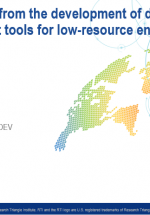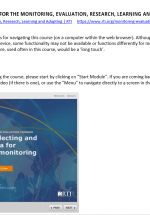Monitoring, Evaluation, and Research
Manual para la evaluación inicial de la lectura en niños de educación primaria (EGRA Toolkit in Spanish)

Este manual es el producto de una colaboración en curso entre una gran comunidad de
académicos, profesionales, funcionarios gubernamentales y profesionales del desarrollo
educativo, para promover la causa de una temprana evaluación y adquisición de la lectura
entre los niños de la escuela primaria en países de bajos ingresos.

Learning to Thrive: Education, opportunity and foundational skills in El Salvador [CIES 2021]

The El Salvador Early Grade Reading Assessment (EGRA) was conducted in 2018 in late June and early July 2018 (toward the end of the El Salvador school year, which runs from January to October). The objective was to provide the Government of El Salvador with information on the reading performance of public school students in second and third grades. The sample was designed to represent government schools at the national level with a minimum enrollment of six students in each of the second and third grades and all of the second and third grade students in these grades. EGRA is an individually administered oral assessment of foundational reading skills; in Spanish, the skills tested include letter sound identification, familiar word reading, and oral reading fluency, among others.
Closing early learning deficits in contexts like El Salvador is critical to improving economic development. According to a World Bank review of the causes of dropout in Central America, skills gaps that are not corrected through additional support and remediation compound over time. Students with weak foundational skills are more likely to struggle and become disinterested as content becomes more complex. As students age, they also face rising direct and opportunity costs and increased risk of teenage pregnancy and violence. Together these factors are associated with higher levels of grade repetition and school dropout. Analyzing El Salvador household survey data, the same report indicated that 40% of youth who had left school cited lack of interest while 25% reported economic causes as the main reasons for dropping out of school. Among girls, personal reasons, including pregnancy and caring for younger siblings, are the highest reported cause at 32%.
The EGRA results indicate that 49% of second graders and 40% of third graders are reading at or below a rate of one correct word per second. Students performing at this level for oral reading fluency are identified as “At Risk” for developing later reading difficulties, and potentially school failure. This means that additional remediation steps, such as intensive instruction and frequent progress monitoring, are needed to increase the chances that these students catch up with their peers. Early skills gaps are associated with higher levels of grade repetition and in contexts like El Salvador, where primary completion is not universal, school dropout. On nearly every component of the assessment, boys, students in rural schools, students from lower-income groups, and students with some form of self-reported disability all scored lower than their more advantaged peers. Income disparities were especially noteworthy: Students in the lowest income group were more than three times as likely to score zero on the oral reading fluency passage relative to students in the highest income group (20% versus 6%).

Teacher Language and Literacy Assessment: Final Report

The Research for Effective Education Programming – Africa (REEP–A) Task Order, awarded in September 2016, is a five-year project within the United States Agency for International Development (USAID) Africa Bureau. The primary objective of REEP–A is to generate and effectively disseminate Africa regional and country-specific education data, analysis, and research to inform the prioritization of needs and education investment decisions.
One research focus under REEP–A is to explore how teachers’ language proficiency and literacy in the language of instruction (LOI) influence students’ learning outcomes. It is hypothesized that the teachers’ level of language proficiency and literacy in the LOI can either facilitate student learning, if high; or impede learning, if low. However, limited data are available on how teacher language and literacy skill levels precisely relate to student outcomes.
Exploring this relationship requires having a valid and reliable tool to measure teachers’ language and literacy skills. USAID therefore commissioned the development of the Teacher Language and Literacy Assessment (TLLA) to assess teachers’ language proficiency and literacy in the required LOI. The TLLA, adaptable to any language, consists of subtasks assessing speaking, listening, reading, and writing, as well as vocabulary and grammar, in the language(s) used for teaching and learning at the primary school level in a given context. It is envisioned that policymakers, researchers, and other education stakeholders can use the TLLA to collect data on teachers’ linguistic assets and gaps in the languages that their role requires them to use. These data could be useful for identifying factors contributing to student learning outcomes, informing teacher training and professional development needs, designing teacher deployment policies, and evaluating the impact of interventions aimed at improving teachers’ or students’ language and literacy skills.
The aim of this report is to present the new tool and disseminate the initial findings around its technical adequacy. The international community has directed considerable effort to assessing and understanding the impact of language on students’ literacy and language skills, and the TLLA is a complementary tool
that shows promise for understanding teachers’ language assets and needs.

Lessons learned from the development of digital coaching support tools for low-resource environments

CIES2021 Presentation on the use of Tangerine:Coach to provide support to teachers around the world.

Language Complexity in the Philippines [CIES Presentation]

Presentation delivered at CIES.This study attempts to determine whether or not the complexity of the L1 should be a factor in interpreting reading achievement in multilingual contexts, as well as in planning early grade reading teaching and learning materials and curricula in settings with complex languages.

ABE-ACR Tanzania National Early Grade Reading Assessment (EGRA) Final Report
This final report describes the progress made from October 1, 2015 - December 31, 2018 under the Tanzania National Early Grade Reading Assessment activity. USAID/Tanzania contracted RTI International to conduct two rounds of student assessments in early grade reading.

Qualitative Research in International Education
This brief describes the use of qualitative analysis in international education research.

Measuring Early Reading Achievement in the Philippines: How Data Can Support Policy-Making? (2019 National EGRA results)
This presentation describes results from the 2019 National EGRA study, comparing it to the same study that was done in 2013. It was presented at the International Mother Languages Conference and Festival, organized in the Philippines in 2021.

Monitoring, Evaluation, Research, Learning and Adapting Online course
RTI’s Monitoring, Evaluation, Research, Learning, and Adapting (MERLA) Community of Practice is proud to launch a free course geared towards the international development community. The course is designed for individuals of all practices (monitoring and evaluation, project management, business development, policy planning) and is intended to provide a foundation for MERLA basics. The five modules cover topics including fundamentals of program design, developing a project logic model (e.g. Theory of Change, Results Framework, etc), designing performance indicators, developing data collection instruments, and much more! No certificate is provided. The course is licensed under Creative Commons CC-BY-SA.

MERLA Course Navigation Guidelines

These navigation guidelines can be used with the MERLA course developed by RTI International for open access. https://www.rti.org/monitoring-evaluation-research-learning-and-adapting

